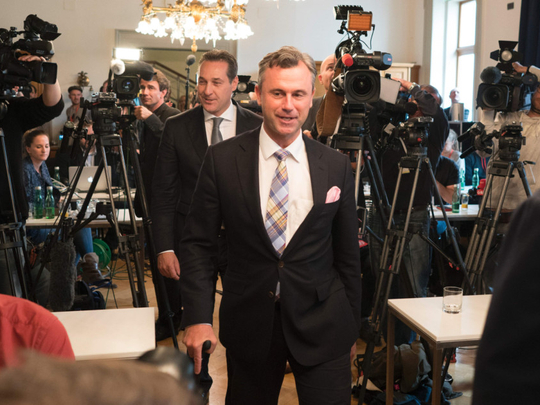
Phew. By the narrowest of margins Norbert Hofer, the presidential candidate of Austria’s far-right Freedom party (FPO), lost to Alexander Van der Bellen, the pro-refugee former leader of the country’s Green party. Polls suggested that the victor owed his win to his mostly young, urban and well-educated base. There was much in it to celebrate. Austria, a cradle of the continent’s far-right and at the forefront of the refugee crisis, has voted in a progressive, pro-refugee son of Estonian immigrants as its head of state. The candidate who had campaigned on what he called a “Muslim invasion” had lost.
Yet, Van der Bellen’s victory is too close for comfort. The country at Europe’s crossroads has just come within a few thousand votes of electing the European Union’s (EU) first far-right head of state. Hofer won more federal states than his rival and was only stopped by postal votes. His far-right party is still on track to finish first in the next parliamentary election, due within the next two years.
Activists I spoke to at the FPO’s “victory” rally in Vienna’s Prater Park last Sunday gave me the clear impression that they would not take the defeat easily — if at all. They called Hofer “the president of our hearts”.
Austria is a polarised nation. Almost exactly half of it, on both the Right and Left, voted for a pro-migration cosmopolitan. And almost exactly half — likewise transcending the traditional Left-Right spectrum — voted for an anti-migration nativist who questions whether the postal votes by which he lost were fair and valid. Austria today is a vision of Europe’s political future; one in which cultural differences between progressive cities and conservative rural areas slice through the old Left-Right axis.
It is easy to point fingers at Brussels and Berlin for waving in refugees and thus inadvertently propelling Hofer to within inches of his country’s presidency. Yet, to do so will be to normalise and excuse what has happened. It is true that the FPO’s success is part of a European pattern. In Austria, Poland, Germany, the Low Countries and Scandinavia, the refugee crisis combined with terror attacks by extremists in Paris and Brussels are driving those voters already uncomfortable about multiculturalism towards far-right parties that, sensing the opportunity, have ditched their more unpalatable policies, put on suits and generally made an appeal to a soft-conservative electorate.
Puppet master
Yet, the fact that Hofer came so close to becoming head of state is also specifically a reflection of Austria’s conventional parties. The centre-left (FPO) and centre-right (OVP) have for decades dominated the country and governed in coalition. Under their rule, unemployment is now rising in Austria while in many European countries it is falling. The traditional parties have struggled to compete with Heinz-Christian Strache, the dynamic FPO leader who posts cheesy but catchy rap videos on YouTube — and who, by most accounts, is Hofer’s puppet master.
Not only did the SPO and OVP create the conditions in which Hofer and Strache could thrive, but they also pandered to the FPO once it had started to gain ground. Having initially endorsed the pro-refugee policies of the German Chancellor, Angela Merkel, the government now insists on draconian controls at the Brenner Pass between Italy and Austria. This is part of a deep historical tradition in Austria. The FPO was founded by former SS officers, and for decades it has maintained links with the sort of far-right student fraternities that exhibit both close connections to the neo-Nazi scene and a broadly pan-Germanist outlook.
Yet, the party has long been tolerated by the Austrian establishment. On a regional level, the OVP and SPO have both entered into coalitions with it. In 2000, it even became part of a national government led by the centre-right. The FPO’s success at the presidential election could prove the springboard it needs to surge ahead at the next parliamentary election and take the chancellorship.
There are lessons here for other centre-right and centre-left parties in Europe and North America. In Austria, the mainstream succumbed to the temptation to pander to its rivals. Its politicians tried to compete on their opponents’ turf: That of migration and national identity. They lost sight of their own strengths: Economic growth and jobs. The result has been a confident, dynamic far-right almost capable of winning the premiership. For Labourites sizing up the United Kingdom Independence Party in England, or Democrats pondering how to fight Donald Trump, Austria foreshadows a bleak future.
— Guardian News & Media Ltd
Jeremy Cliffe is the Economist’s UK politics correspondent.







